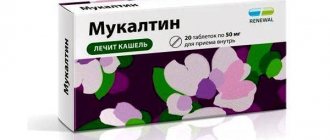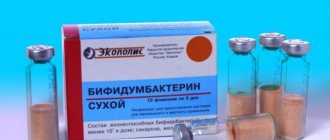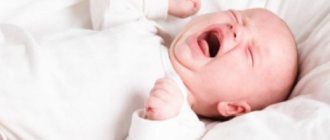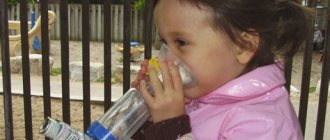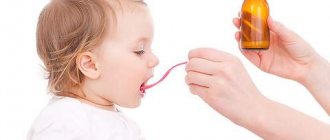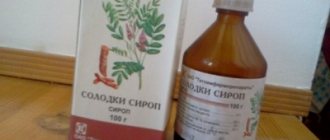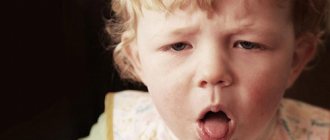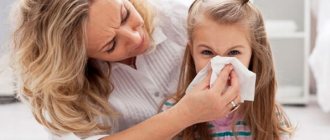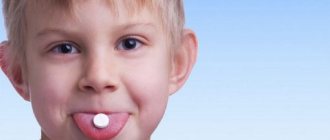Almost every respiratory disease in children is accompanied by a cough. Young patients do not tolerate such infections well. Frequent attacks can lead to breathing problems. Dry cough syrup for children helps prevent their development.
Composition and release form
The children's medicine that helps cure cough contains the following components:
- Dried marshmallow root extract.
- Anise oil.
- Ammonium chloride.
- Licorice root extract.
- Sugar.
- Hydrocarbonate.
The manufacturer of the medicine assures customers of the effectiveness of its product. A positive result after treatment with this remedy is guaranteed by the unique combination of anise oil and licorice root. Due to this compound, the drug has an anti-inflammatory and analgesic effect on the patient’s body.
Ammonium chloride affects the coughing process, and sodium bicarbonate improves the liquefaction of accumulated mucus. The addition of sugar makes the taste of the medicine more pleasant for the baby.
The powdered mixture, which treats coughing attacks, is available in special packaging in the form of glass bottles and bags made of thick paper.
Each individual paper bag contains exactly 1.47 g of medicinal powder. This is a single dose of medicine that should be taken by a sick child over twelve years of age. If he has not yet reached this age, then the dosage of the drug should be reduced.
On the packages of the mixture there is information about exactly how the powder should be diluted and how to take it. Please note that the drug does not indicate the exact dose for small children. So it is advisable to discuss this issue with your pediatrician in advance.
Medicines to combat cough in children
Below we will consider the means used to eliminate cough and respiratory failure caused by retention of bronchial secretions (sputum). Normalization of breathing in this case is achieved by thinning and improving the discharge of sputum with the help of expectorants and mucolytics.
Expectorants
Expectorants are substances that can enhance the secretion of secretions by the bronchial glands. Increased secretion by the bronchial glands helps to liquefy mucus and facilitate its movement into the upper respiratory tract and elimination during coughing. Expectorants have two types of action: reflex and resorptive. Quite difficult terms to understand. Next, we will consider the essence of each type of action.
Many parents ask the question: “How can syrup taken orally affect the bronchi and cough?”. The answer to this question is the mechanism of action of reflex expectorants. Taken orally, they irritate the endings of the nerves of the gastric mucosa and reflexively increase the secretion of the bronchial glands (increase the amount of sputum). The mechanism of resorptive action is different. After ingestion, they are absorbed in the intestine, secreted by the bronchial mucosa and stimulate bronchial secretion.
Mucolytic agents
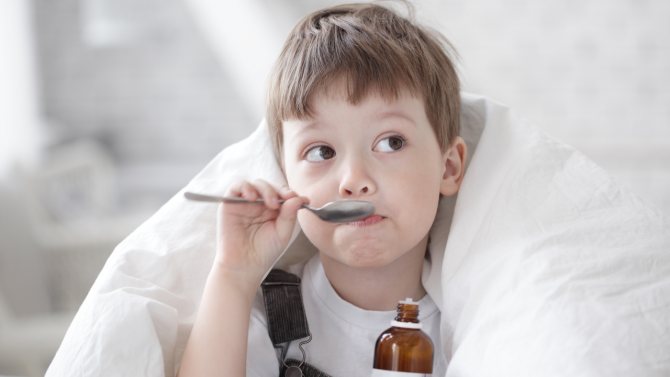
Mucolytics, unlike expectorants, directly change the physical and chemical properties of sputum, destroying its mucus-forming components. That is, mucolytics dilute sputum without increasing its volume.
Antitussives
This does not mean a general name, but a specific group of drugs. There are antitussive drugs of central and peripheral action. Centrally acting agents inhibit the cough center and are most effective. Peripheral antitussives are less effective. Their mechanism of action is an anesthetic and anti-inflammatory effect on the mucous membrane of the upper respiratory tract.
Having examined the main causes of cough in children, the main groups of drugs for cough treatment, let’s move on to the rating of the best children’s cough medicines for children.
Pharmacological action of antitussive medicine
Treatment with dry medicine helps improve the functioning of the bronchi, which is impaired due to illness. This drug relieves spasms that cause coughing. The effect of such therapy becomes noticeable a couple of days after the start of its use.
By this time, the organs of the respiratory system get rid of sputum, in which pathogenic microorganisms actively multiply.
Thanks to the drug, severe symptoms of respiratory tract disease disappear. It also reduces pain. Doctors recommend drinking the mixture for the wet form of the pathology. It is not suitable for eliminating the dry type of cough.
Application and dosage
The dry mixture should be taken orally after diluting it with water in the required proportions. The duration of treatment is on average 7-10 days. Good positive results are achieved when using this remedy in combination with other drugs.
The main thing is to know how to breed. The method of preparing the medicine is very simple. To dilute the powder you will need boiled water. The resulting mixture is thoroughly mixed to a uniform consistency, after which it is ready for use. Children aged 12 years and above require 1 sachet of powder, diluted in 15 ml of water, which corresponds to 1 tablespoon. If the mixture is contained in a bottle, it is filled with water to the 200 ml mark. Next, before each dose, the bottle is shaken so that the active substances are evenly distributed. It is not advisable to dilute the mixture with juices, tea or compote, due to a decrease in its effectiveness.
The medicinal dose is calculated individually, in each specific case. Everything will depend on the severity of the disease. For adults, this mixture is prescribed three times a day after meals. The pediatric dose depends on the age of the child:
When choosing a dose, the simultaneous use of other drugs should be taken into account. The dry mixture combines well with other remedies, without any health risks. The simultaneous use of antitussives and expectorants is undesirable since they have different directions and degrees of influence on the respiratory organs. Otherwise, stagnation of sputum, accompanied by inflammation, is possible in the bronchi.
Indications for use
Experts recommend using dry cough syrup, which is in bags, for diseases of the respiratory system. Due to the fact that it has a strong expectorant, antitussive and anti-inflammatory effect.
The medicine should be used during treatment:
- Tracheitis;
- Laryngitis;
- Pneumonia;
- More mild colds.
The medicine is often prescribed to children as an independent medicine. However, to achieve a faster recovery, it is worth combining it with other medications that have a similar effect.
A treatment option is allowed that includes alternating medications. For example, in the morning you can give a sick child an expectorant, and in the evening you can give him a mixture so that he can sleep well at night.
Advantages and disadvantages of the drug
An undoubted advantage is that this drug contains a lot of natural ingredients and they are unlikely to harm the child’s health. This medicine can be taken from a relatively young age, after the child is 6 months old. Children's dry cough medicine perfectly thins mucus and helps remove it, relieves spasm, swelling and pain from the respiratory tract. As for the side effect, it occurs extremely rarely and is rather an exception.
Many parents say that this drug did not help their child. But this depends rather on the individual characteristics of the little patient’s body, on the degree of neglect of his disease. In addition, some mothers complain about the specific taste of the drug; children drink it reluctantly. As for the kids, even if they manage to pour a spoonful of medicine into their mouth, they spit it out, and the treatment cannot take place. Unfortunately, medicine does not always taste good.
Contraindications
Dry mixture consists of components of plant origin. This means that it does not have a negative effect on the child’s weakened body. However, doctors recommend that patients who have a high sensitivity to certain components of the drug not take the drug.
Women should not be afraid to be treated with the mixture while carrying a child. It is also not prohibited for use during breastfeeding. The main thing is that neither the mother nor the baby experience negative consequences after such therapy.
Do not give cough medicine to children under six months of age. It is also necessary to exclude this medicine from therapy selected for people with diabetes.
Video on the topic
Dr. Komarovsky about the causes and treatment of cough in children:
Thus, there is a wide range of cough syrups. When choosing them, you need to pay attention to the composition and age restrictions. Treatment should be selected by the doctor based on the type and cause of the cough.
For children over one year old, pediatricians often prescribe Linkas, Licorice syrup, and Prospan. If desired, parents can prepare the mixture themselves. When choosing components, you should take into account their tolerance to the child’s body.
Side effects
As a rule, this drug in the form of a powder for dilution is well tolerated by patients. However, in rare cases, side effects occur after taking it. This should be blamed on the body's increased sensitivity to individual components of the mixture.
Side effects include the following:
- Itching.
- Skin rash.
- Hives.
These phenomena are caused by the development of an allergic reaction to the drug. Once the patient stops taking it, the side effects will disappear immediately.
Indications for use of the drug
The mixture is taken when sputum is difficult to separate to relieve cough. The product effectively helps with diseases of the trachea, bronchi and lungs.
What is the effect of the drug? A drug made from medicinal herbs eliminates inflammation and relieves spasms, helps reduce viscosity and separate mucus due to the healing properties of the plants included in its composition.
- Marshmallow is available in the children's portion of the powder. It is not for nothing that medicine has paid attention to this plant. It contains a lot of mucus, which makes it similar to flax. It is this thick liquid that performs the main therapeutic effect, enveloping the irritated mucous membrane of the respiratory tract. Forming a thin layer, it promotes rapid healing of the inflamed mucosa.
- Thermopsis (in an adult portion of powder). It is classified as an expectorant due to its high content of essential oil, mucus, tannins and ascorbic acid. Thermopsis is not used in children's medicines, since the plant is classified as poisonous and studies have not been conducted on children.
- Licorice has a wide range of uses. For diseases of the respiratory system, it provides indispensable help with its antispasmodic, wound-healing and anti-inflammatory effects.
- Anise. The medicinal properties are concentrated in the seeds of the plant, or more precisely in the ether they contain. Anise oil is widely used in many industries, for example, in confectionery, perfumery, etc. In medicine, this valuable product is at the forefront of herbal preparations for diseases of the throat, bronchi, lungs, and loss of voice. Anise has an antipyretic effect. Antibiotics in combination with anise enhance their effect, this must be remembered.
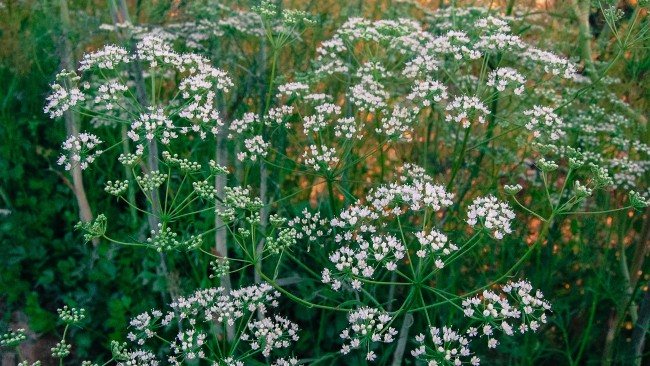
What are the prohibitions on using the product? Along with beneficial properties, the plants included in the mixture have a number of contraindications:
- any kidney disease;
- pregnancy;
- breast-feeding;
- diabetes.
Each person’s body perceives the components that dry anti-cough mixture contains in its own way, so the effect is different.
Side effects include an allergic skin rash, nausea, vomiting, and diarrhea. If such symptoms occur, treatment with this drug should be discontinued.
Cases of overdose
To avoid an overdose of the medicine, you should take only the portion of the medicine that was recommended by the doctor or indicated in the description of the medicine. If these rules are not followed, the patient may experience nausea and vomiting.
If signs of overdose are detected, therapy should be stopped immediately. It is advisable to lavage the patient’s stomach and give him a drug from the group of enterosorbents.
- Inexpensive remedies for dry cough in tablet form;
- The best expectorants for dry cough;
- Simple instructions for using ACC for cough.
What kind of cough syrup can be given to a baby?

They are obtained by mixing medicinal substances in water or alcohol, oil, or syrup. The drug may contain 1-2 active elements or be multicomponent. As a rule, cough syrup for children over one year old has a sweet taste.
Most of the medications proposed by pharmaceutical companies for the treatment of cough in children are natural and approved for use from an early age. The mixtures contain antiseptics, anti-inflammatory, antihistamines and other medicinal components.
This allows you to fight different types of cough. It is important to understand for which pathologies which remedy is best to use. Effective cough medicines for children: Prospan, Gerbion, Licorice syrup, Bronchosept, Linkas.
Before buying a cough medicine, you need to read its instructions. Particular attention should be paid to the sections on contraindications, adverse reactions, methods of use and dosages.
overslept
This cough remedy is based on ivy leaf extract. It has mucolytic, expectorant, antimicrobial, bronchospasmolytic effects. The drug reduces the viscosity of sputum, thereby facilitating its discharge.
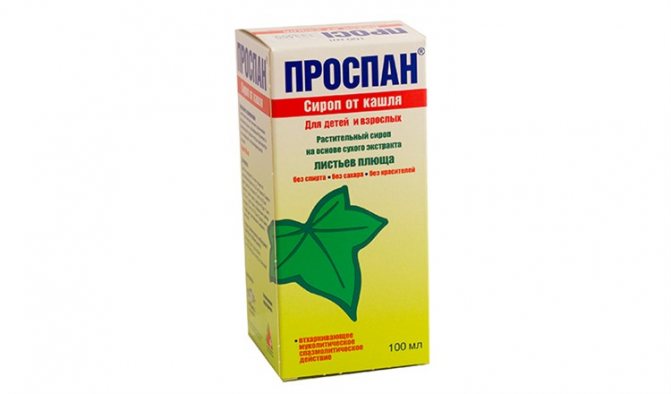
Syrup Prospan
Used to treat chronic and acute inflammatory pathologies of the upper respiratory tract . Prospan syrup is approved for use by newborns, infants and older children. The dosage is selected individually by the pediatrician.
As a rule, a baby up to one year old is given 2.5 ml of solution twice a day in the evening and morning hours. Children 1-6 years old are recommended to use syrup in the same amount, but three times a day. It is important not to exceed the dosage, as this can lead to the development of shortness of breath, vomiting, diarrhea, and nervous agitation.
Gerbion
Gerbion is a syrup for the treatment of dry and wet coughs. Derived from extracts of medicinal herbs. The drug has a softening and expectorant effect. The main components of the medicine dilute viscous sputum and speed up its discharge.
Herbion is available in three types:
- with plantain, ascorbic acid, mallow flowers, essential orange oil (increases local immunity, cleanses the body, suppresses the cough reflex);
- with primrose, thyme (effective in the treatment of spasmodic, non-productive cough);
- with ivy (suitable for the treatment of dry cough).
All types of medicine have a herbal aroma and a sweetish taste.
The product is packaged in bottles and comes with a measuring spoon. Herbion is considered a fairly effective cough suppressant. But this is not the best choice for one-year-old children.
The instructions indicate that this drug is approved for use from the age of two. The use of Gerbion in infants can provoke an intolerance reaction and a number of other side effects.
Methods of using medicinal medicine
If the patient does not comply with the rules of treatment with a particular drug, then he will not be able to achieve a positive result from such therapy. The patient will receive all important information about this at a doctor’s appointment.
For adults and children, the rules for using the product are different. They have the following features:
For adults
The medicine is prescribed as an auxiliary drug in complex therapy or as an independent medicine. A measured dose of powder should be mixed in boiled water. It should be cool. If the powder is not in a bag, but in a bottle, then you need to proceed as follows:
- Open the container and fill it with water to the 200 ml mark;
- Afterwards, shake the bottle well;
- If the powder in sachets is preferred, then you just need to stir it in 15 ml of drinking water.
A single dosage of the drug is taken three times a day, a tablespoon. The average course of treatment is three weeks. During this time, the patient manages to completely recover from cough.
For children
The medicine for small patients is used on the same principle as for adults. The optimal dosage is determined depending on the age of the child and the duration of the drug course of treatment.
The medicinal mixture is given to the child three times a day.
- Infants are prescribed to take 15 drops at a time, children under two years old - 40 drops.
- Children under six years of age are given a teaspoon of medicine.
- A child who has not yet turned ten years old is recommended to take no more than two teaspoons of the mixture.
The duration of treatment is from one to two weeks. The optimal duration of therapy is determined by the child's attending physician.
It is highly undesirable to neglect the rules for determining the appropriate dosage of a drug. After all, this is the only way the patient will be able to avoid the side effects of the medicine.
Dry cough syrup for children in bags: composition and method of preparation (instructions from the doctor)
The basis of cough is the excessive formation of mucus by the bronchial glands; this occurs when pathogenic microbes or allergens enter the body. The amount of bronchial contents can also increase due to unfavorable physical factors, for example, if the air in the room is too dry and warm.
On pharmacy shelves you can see a variety of cough remedies for children in various price categories. But are expensive advertised drugs really different from cheap analogues? Let's read the instructions for an inexpensive but high-quality medicine - dry cough syrup for children.
What is dry medicine
Dry children's cough medicine is a medicinal product that belongs to the combination of drugs. The mixture not only has an expectorant effect, but also helps relieve inflammation and relieve spasm of the smooth muscles of the bronchi.
The medicine contains extracts of medicinal plants. This combination of components helps to quickly cope with many airway diseases.
The medicine is produced in dry form, in powder form. You can find the drug packaged in waterproof paper bags of 2 g, or in a 200 ml bottle.
Composition of dry cough syrup for children
The component of the drug is dry marshmallow root extract. The substance is absorbed into the blood and partially secreted by the bronchial glands. Thus, marshmallow extract has an anti-inflammatory effect, envelops and softens the bronchial mucosa.
The medicinal substance increases the production of bronchial secretions and affects its character, the sputum becomes less viscous. Thanks to the ability of marshmallow root to enhance the work of the ciliated epithelium of the bronchi and the movement of bronchioles, the removal of sputum is facilitated.
The substance actively dilutes sputum, changing the acidity of bronchial secretions. Also, sodium bicarbonate can enhance the function of the ciliated epithelium of the bronchi.
Dry extract of licorice root has an anti-inflammatory effect and reduces the viscosity of bronchial mucus. Due to its antispasmodic effect, the substance helps in the removal of sputum.
The oil has an expectorant effect and effectively reduces inflammation in the bronchi.
Ammonium salt stimulates the removal of sputum.
- Excipients, sugar
Thanks to its complex action, the medicine effectively softens dry cough, relieves inflammation in the airways and promotes easy expectoration of mucus.
Children's dry cough medicine is prescribed for diseases of the respiratory system, which are manifested by a cough with thick sputum that is difficult to cough up.
The medicine is recommended for use in bronchitis, laryngitis, tracheitis, bronchopneumonia in adults and children.
It is possible to prescribe the medicine as part of therapy for the treatment of other diseases accompanied by cough, such as pleurisy, tuberculosis.
Doctors prescribe the mixture to patients from 12 months of age with mild to moderate disease. It is possible to prescribe the medicine as an independent treatment. If the disease is more serious, complex therapy may be required.
Rational cough therapy is selected by the doctor after examination and auscultation of the lungs. If treated incorrectly, the child's condition may worsen and the inflammation may spread more deeply.
Since the drug is produced in dry form, parents must properly dilute the product before use. Proper preparation of the mixture will ensure an accurate dosage regimen for the medicine.
When examining a bottle of powder, it is easy to find a mark on the bottle that indicates the required liquid level.
You need to add boiled water to the dry product, the temperature of which is about 40 degrees. Then shake the bottle well until the powder is completely dissolved.
The powder for preparing the medicine, like the finished mixture, has a brown-gray color. The drug has a sweetish taste and anise smell.
The contents of the bottle should be shaken before each use of the medicine.
If the medicine is packaged in sachets, it must be diluted by mixing with 15 ml of water. The baby is given the dose of the drug prescribed by the doctor.
How to use cough syrup?
The instructions will give you the dosage regimen, but your doctor will help you determine the exact dose of dry powder in each specific case.
When dosing the medicine, a measuring spoon or dispenser syringe is used to accurately determine the volume of the liquid medicine.
For children from 1 to 6 years old, it is enough to take 1 teaspoon of 5 ml 3 – 5 times a day. Children over 6 years old are recommended to take 10 ml of the mixture per dose, and children over 12 years old – 15 ml.
If the medicine is in a bag, the dry substance is mixed with 15 ml of water and given to the baby 3 to 4 times a day.
For babies from one to 2 years of age, it is recommended to take 40 drops of the medicine; for children 3 to 4 years old, half a teaspoon (2.5 ml per dose) is enough.
Older children, 5 - 6 years old, are given 2/3 of a teaspoon, which is 3.75 ml, and children 7 - 8 years old - 1 teaspoon of 5 ml. From 7 to 12 years old it is recommended to take 10 ml of the medicine, and from 12 years old and for adults - 15 ml.
The medicine is used after meals. The duration of treatment with the mixture is determined individually, but on average it is 5 – 7 days.
Doctors warn that using the mixture for more than 2 weeks risks the development of complications and adverse reactions.
Although children's cough syrup has been widely used for many years, there are some contraindications.
- Component intolerance
If there is a suspicion of intolerance to any component of the mixture, you need to choose another drug to treat the disease.
Diseases of the urinary system, such as pyelonephritis and glomerulonephritis, are also contraindications.
- Child's age up to 1 year
The manufacturer does not recommend prescribing the medicine to infants under 12 months.
It is necessary to refuse treatment with the mixture for children with carbohydrate metabolism diseases, intolerance to fructose, sucrose, and diabetes.
- Taking cough suppressants
Taking cough suppressants and expectorants at the same time may worsen the child's condition.
This is due to the influence of the mixture on the properties of sputum, increased by its formation. Suppressing a child’s cough with the help of antitussive drugs causes stagnation of secretions in the bronchi and the infection spreads deeper.
Taking medication for an allergic cough may worsen the symptoms of the disease.
Side effects
When taking dry cough syrup in children, in rare cases, unwanted reactions may occur. It is possible that allergies may occur with symptoms of urticaria, rash and itching, redness and swelling of the skin.
Manufacturers
Regardless of the manufacturer of the medicine, the composition of the medicine remains unchanged. The main drug manufacturers in Russia: Vifitex, Moscow Pharmaceutical Factory, Lumi.
Reviews about the use of the medicine
Reviews about the medicine are mostly positive; doctors emphasize the naturalness and safety of the drug, which allows the medicine to be widely used in pediatrics. Parents are attracted by the rapid development of the effect of treatment, the pleasant taste and low price of the product.
The negative qualities of the medicine include the short shelf life of the diluted product and the inability to use it for severe infections.
- A cough can indicate a variety of illnesses. Therefore, the treatment of symptoms differs in different children.
- Treatment for different types of cough is different; a specialist will help prescribe proper treatment.
- Cough medications and expectorants should never be prescribed at the same time. For a debilitating cough, it is possible to use antitussive medications at night and expectorants during the day.
- The effect of the mixture appears on 2–3 days from the start of administration. If your cough does not change, consult your doctor.
- Treatment with dry mixture should not last more than 2 to 3 weeks.
- When treating a cough with expectorants, the child should receive enough fluid, this will reduce the viscosity of the sputum.
The more warm drinks a child drinks, the less viscous the sputum becomes.
- To effectively treat a cough, you need to take care of the quality of the air you inhale. Do not forget about ventilation and daily cleaning of the room. Dry warm air has an adverse effect on the mucous membrane and reduces its protective properties.
The range of drugs for the treatment of diseases of the respiratory system is huge. In addition to expensive advertised drugs, budget funds do not lose their relevance. Cough medicine has been popular among doctors and parents for a long time. To find out what dry cough syrup is, you need to carefully read the instructions for the medicine.
Dry cough syrup is an effective, natural remedy for the treatment of respiratory infections. The medicine is made from components of plant origin, which gently and effectively help overcome the disease. The effectiveness of the drug has been tested by time, and the minimal number of side effects makes it possible to prescribe the drug to children.
To ensure that the results of treatment are not disappointing, you need to ask your doctor’s advice and choose the right treatment regimen. After reading the instructions for the drug and consulting with the doctor, parents can be confident in the correctness of the chosen treatment and safety for the health of the baby
Source: https://kroha.info/health/sredstva/kak-pravilno-prigotovit-i-suhuyu-miksturu-ot-kashlya
Analogs of dry cough syrup
Dry mixture is prescribed by many specialists who treat coughs in adults and children. For a number of reasons, patients sometimes purchase not the prescribed drug, but its equally effective analogue.
The mixture can be replaced with the following drugs:
- "Bronchofit."
- "Mukaltin."
- "Ambroxol".
- "Plantain syrup."
- "Pertusin".
- "Macrotussin."
- "Bronchoflox".
Medications that are analogues of dry medicine have similar pharmacological effects. The difference between medications mainly lies in their composition.
Before replacing a prescribed medicine with its analogue, you should ask your doctor whether this can be done and which drug is best to give preference to. Excessive precautions will allow you to achieve a quick recovery and avoid unpleasant consequences from taking the wrong drug.
dry cough mixture for children
FOLK RECIPES FOR COUGH For the treatment of cough in children, medications based on natural products are much more effective than chemical drugs. The choice of such medicines is now widely available in every pharmacy, but you can prepare a mixture for your baby yourself, using the experience of traditional medicine. However, before using any folk recipe, be sure to consult with your child’s doctor! Show in full..
When treating coughs in children, healer Vanga advised boiling 1 potato, 1 onion and 1 apple in 1 liter of water. Cook until the water is reduced by half. Give this decoction to the child 3 times a day, 1 teaspoon. Fresh cabbage juice with sugar is useful as an expectorant for cough and hoarseness. A decoction of cabbage with honey works well. Pour 1 tablespoon of pine buds with 1 glass of boiling water, leave, covered, for 40 minutes, strain. Take 1-2 sips when you feel the urge to cough. Honey with olive oil: mix bee honey and warm olive oil in equal proportions. Give small children 1 teaspoon 3-4 times a day when coughing. The drug is also effective in the treatment of whooping cough. Sweet radish: cut the washed and peeled black radish into thin slices and sprinkle with sugar. After 6-8 hours, you can drink the released juice, 1 tbsp. spoon every hour when children cough. Balm for bronchitis. Take 500 g of crushed walnuts, 300 g of honey, 100 g of aloe juice and add the juice of 4 lemons. Mix everything well and take 1 teaspoon for children 3 times a day half an hour before meals for coughs, bronchitis, etc. Honey with aloe: dilute 300 g of honey with half a glass of boiled water, add finely chopped aloe leaf and cook over low heat for 2 hours. Then remove from heat, stir and leave to cool. Children take 1 teaspoon or dessert spoon, depending on age, 3 times a day for bronchitis. To treat a cough, boil one lemon over low heat for 10 minutes. Then cool, cut off the peel, squeeze the juice into a glass. Add two tablespoons of glycerin and fill the glass to the top with honey. After thorough mixing, drink a teaspoon several times a day, preferably an hour before or two hours after meals, in the morning - on an empty stomach. This mixture is tasty and harmless, and easily cleanses the lungs and bronchi. Radish and carrot juice with honey: mix 100 ml of radish, carrot juice and a tablespoon of honey. Take a teaspoon 4-5 times a day. Infusion of anise with honey: 2 tbsp. spoons of anise seeds, pour 0.5 liters of boiling water, close the lid and place in a boiling water bath for 15 minutes. Then remove, let stand for 20-30 minutes, strain, dilute honey in the infusion (a tablespoon of honey per glass) and take 1-2 tbsp. spoons 3-4 times a day. Viburnum with honey: rinse 100 g of viburnum berries, pour in 200 g of honey, cook over low heat for 5 minutes, cool at room temperature and take a tablespoon of the mixture 4-5 times a day with warm water. A decoction of young shoots was eaten in milk: boil 30 g of young chopped shoots for 10 minutes in a liter of milk, leave for 2-3 hours, strain and drink a tablespoon 3-4 times a day. Turnip decoction: 2 tbsp. pour a tablespoon of chopped turnip root into a glass of boiled water, cook for 15 minutes, leave for half an hour to an hour, strain, bring the volume of the decoction with boiled water to 200 ml and drink 1/4 cup 4 times a day for bronchitis. Marshmallow infusion with honey: pour a tablespoon of dry crushed marshmallow root (particles no more than 3 mm) into a glass of cold boiled water, strain after an hour, squeeze out the remaining raw materials, add honey to the resulting slimy infusion to taste and drink a teaspoon every 2 hours at chronic bronchitis, tracheitis, laryngitis, pneumonia and bronchial asthma. Take lingonberry juice, mixed in half with honey, a tablespoon 3-4 times a day. Drink 1/4 cup of freshly squeezed cucumber juice 2-3 times a day for bronchitis, tracheitis and other respiratory diseases. Curd compress: warm the curd, drain the whey, put the curd on gauze, and then tie it to your chest for 30-40 minutes. This is the only thermal procedure that can be done at high temperatures. Flatbread for bronchitis: one teaspoon each of mustard powder, corn flour, vegetable oil, honey, vodka or cologne. Mix everything, divide into two parts, place on cloths, apply to the chest and back. Wrap in a thin diaper or elastic bandage, put on pajamas. In the morning, remove and wipe with a damp cloth soaked in warm water. A mixture of mustard and cough flour: mix 1 tablespoon of dry mustard with 1 tablespoon of gray flour. Take an old vest-type shirt in which you need to cut the sleeve completely at the shoulder. Sprinkle the dry mixture onto the shirt in an even layer, place it on the child’s back, put one arm in the sleeve, and make a button on the other sleeve. Pour the mixture onto the chest, excluding the area of the heart, and lightly bandage from below and from the shoulder. Do it before bed and it is advisable to put it right away so that the child does not get up until the morning. There will be no cough the next day. Sometimes I had to do it again, but rarely. It's good to have sweet almond oil in your medicine cabinet. It is given to children for coughs and anemia - 1 teaspoon before lunch and 2 teaspoons after dinner, mixed with fresh milk or boiled honey. The oil clears the throat of phlegm and saliva, treats diseases of the gastrointestinal tract, restores appetite in case of dangerous pneumonia, and in general for any other inflammation. Such patients are given 1 teaspoon of oil 3-4 times a day. For various ear diseases, it has a good effect - you should drop 6-8 drops into the sore ear and cover it with a piece of cotton wool. For a runny nose, cough and other respiratory diseases, you can boil 3 tbsp in a saucepan. spoons of pine buds and breathe over the steam, wrapped up. After the procedure, it is not recommended to go outside for 2-3 hours. For attacks of dry cough, finely chop the orange along with the peel, add sugar and cook for 30 minutes. Take the resulting syrup 1-2 tsp. with every coughing attack.
Patient reviews
Many patients who treated a severe cough with dry mixture left their feedback about this remedy. The bulk of comments regarding the dilution powder are positive.
The low cost of the drug and its high efficiency played an important role in this. If the medicine is used correctly, the patient will quickly recover.
The medicine is one of the safest and most effective drugs that are used to treat patients of different age groups. However, in order to avoid a negative reaction of the body to the components of the medicine, you should not use it for medicinal purposes without obtaining approval from a specialist.
Suitability0
